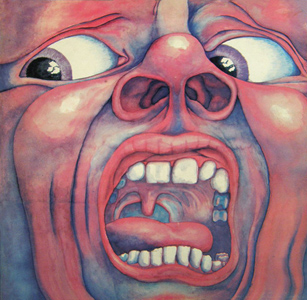
In the Court of the Crimson King is the debut studio album by English rock band King Crimson, released on 10 October 1969 by Island Records. The album is one of the first and most influential of the progressive rock genre, where the band combined the blues influences that rock music was founded upon with elements of jazz, classical, and symphonic music.

Ziggy Stardust: The Motion Picture is a live album by English musician David Bowie, released in October 1983 in correspondence with the film of the same name. The music was recorded during the Ziggy Stardust Tour at the Hammersmith Odeon in London on 3 July 1973, although the album was not issued by RCA Records until 1983. Prior to that it had existed in bootleg form, notably His Masters Voice – Bowie and the Spiders From Mars' Last Stand.

Sally Can't Dance is the fourth solo studio album by American musician Lou Reed, released in August 1974 by RCA Records. Steve Katz and Reed produced the album. It remains Reed's highest-charting album in the United States, having peaked at #10 during a 14-week stay on the Billboard 200 album chart in October 1974. It is also the first solo Lou Reed album not to feature any songs originally recorded by Reed's earlier band, the Velvet Underground, as well as the first of Reed's solo studio albums to be recorded in the United States.

The Golden Age is the third studio album by American alternative rock band Cracker. It was released on April 2, 1996, by Virgin. Three singles were released from the album: "I Hate My Generation," "Nothing to Believe in," and "Sweet Thistle Pie."
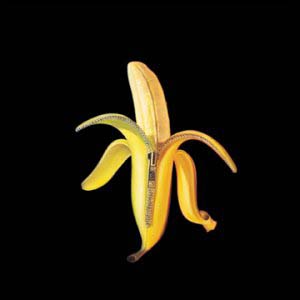
Welcome to the Monkey House is the fourth studio album by American rock band The Dandy Warhols. The album was recorded between September 2001 and December 2002, and released on May 5, 2003 through record label Capitol.

Gentle Giant is the first album by British progressive rock band Gentle Giant, released in 1970.

Kiln House is the fourth studio album by British blues rock band Fleetwood Mac, released on 18 September 1970 by Reprise Records. This is the first album after the departure of founder Peter Green, and their last album to feature guitarist Jeremy Spencer. Christine McVie was present at the recording sessions and contributed backing vocals, keyboards and cover art, although she was not a full member of the band until shortly after the album's completion.

New Magnetic Wonder is the sixth studio album from The Apples in Stereo. The album was produced by Robert Schneider with additional production and mixing by Bryce Goggin and was recorded in four separate states. The album was released on February 6, 2007 via a co-venture between the actor Elijah Wood's Simian Records, Yep Roc Records and Elephant 6.

Carmen was a British-American band active from 1970-75. Their style was a fusion of rock, progressive, and flamenco music and dance. Carmen's first album, Fandangos in Space, is ranked number 46 in the Rolling Stone list of 50 Greatest Prog Rock Albums of All Time.
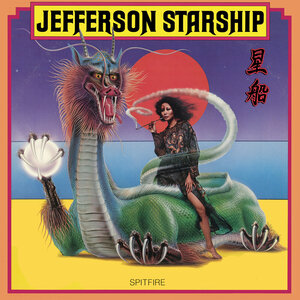
Spitfire is the third album by the rock band Jefferson Starship. Released in 1976, a year after the chart-topping Red Octopus, it quickly scaled the charts, peaking for six consecutive weeks at No. 3 in Billboard and attaining a RIAA platinum certification. The album features writing contributions from members of singer Marty Balin's former band Bodacious DF, as well as Jesse Barish, who became one of Balin's frequent collaborators. Stereo and quadraphonic mixes of the album were released. "Song to the Sun" was included in the 1977 Laserock program.

Solar Fire is the fourth studio album by Manfred Mann's Earth Band, released in 1973. It spent 15 weeks on the Billboard 200 charts, peaking at number 96 on May 11, 1974.

War Babies is the third studio album by American pop music duo Hall & Oates. The album was released on October 19, 1974, by Atlantic Records. It was their last of three albums for Atlantic Records before moving to RCA Records. The album was produced by Todd Rundgren. Rundgren and other members of Utopia, his then-recently-formed prog-rock band, perform on the record.
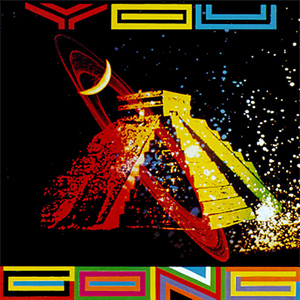
You is the fifth studio album by the progressive rock band Gong, released by Virgin Records in October 1974. It is the last album by Daevid Allen's iteration of the group until 1992's Shapeshifter. Recorded at Virgin's Manor Studios in Oxfordshire, England, side 1 was mixed at Pye Studios, Marble Arch, London, while side 2 was mixed at The Manor. It was produced by Simon Heyworth and Gong "under the universal influence of C.O.I.T., the Compagnie d'Opera Invisible de Thibet", and also engineered by Heyworth.

The Single Factor, released in 1982, is the ninth studio album by English progressive rock band Camel. The album was essentially a contractual obligation album, created under pressure from Decca Records to produce a hit single, and the "made-to-order" nature of its composition resulted in a selection of songs described as "odd" on the band's official website. Unlike previous Camel albums, The Single Factor consists exclusively of shorter compositions around 3 to 5 minutes in length.

From the Witchwood is the fourth album by the English band Strawbs. It was recorded at Air Studios in London during February and March 1971 and reached number 39 in the UK Albums Chart on 17 July 1971.

Grave New World is the fourth studio album by English band Strawbs, their fifth overall. It was the first album to be released after the departure of Rick Wakeman, under circumstances about which band leader Dave Cousins was very bitter. Cousins has admitted that the track "Tomorrow" was written about Wakeman. Happily their friendship survived, and the two have since performed and recorded together, releasing an album Hummingbird in 2002.

Hero and Heroine is the 6th studio album by English band Strawbs.

Sebastian Hardie were Australia's first symphonic rock band. They formed in Sydney in 1967 as Sebastian Hardie Blues Band but dropped the 'Blues Band' reference when they became pop-oriented. By 1973 they developed a more progressive rock style, and later performed as Windchase, but disbanded in 1977. An early member of Sebastian Hardie was Jon English, who starred as Judas Iscariot in the Australian version of the stage musical Jesus Christ Superstar in 1972, he subsequently had a solo career as a singer, actor and playwright. A later member, Mario Millo became a multi-award winner for his television and movie music.
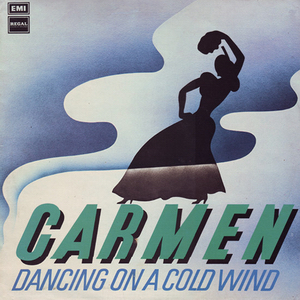
Dancing on a Cold Wind is a 1974 album by flamenco-rock band Carmen. It was later released on a double CD set with the band's previous album, Fandangos in Space.
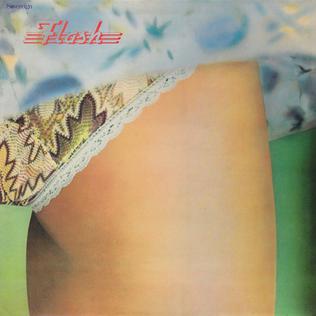
Flash is the self-titled debut studio album by British band Flash, released in February 1972 by Sovereign Records.




















